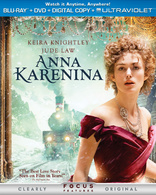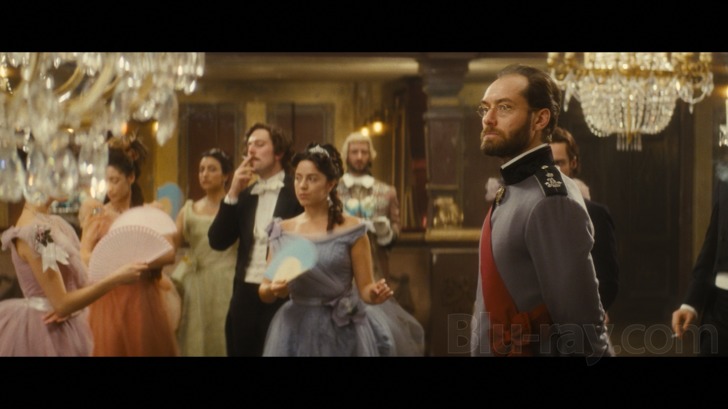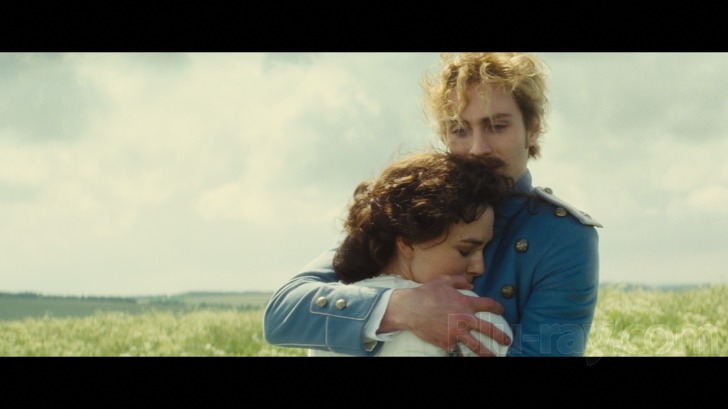Anna Karenina Blu-ray Movie
HomeAnna Karenina Blu-ray Movie 
Blu-ray + DVD + UV Digital CopyUniversal Studios | 2012 | 130 min | Rated R | Feb 19, 2013

Movie rating
6.5 | / 10 |
Blu-ray rating
| Users | 4.0 | |
| Reviewer | 4.0 | |
| Overall | 4.0 |
Overview
Anna Karenina (2012)
In 19th-century Russia, the aristocratic Anna Karenina, the wife of a powerful government minister, begins an intense romantic relationship with Count Vronsky, a wealthy and dashing military man whose infatuation with Anna prompts her to desert her husband and son.
Starring: Keira Knightley, Jude Law, Aaron Taylor-Johnson, Kelly Macdonald, Matthew MacfadyenDirector: Joe Wright (IV)
| Drama | Uncertain |
| Romance | Uncertain |
| Period | Uncertain |
| Melodrama | Uncertain |
Specifications
Video
Video codec: VC-1
Video resolution: 1080p
Aspect ratio: 2.39:1
Original aspect ratio: 2.39:1
Audio
English: DTS-HD Master Audio 5.1
Spanish: DTS 5.1
Subtitles
English SDH, French, Spanish
Discs
50GB Blu-ray Disc
Two-disc set (1 BD, 1 DVD)
UV digital copy
DVD copy
BD-Live
D-Box
Mobile features
Packaging
Slipcover in original pressing
Playback
Region free
Review
Rating summary
| Movie | 3.0 | |
| Video | 4.5 | |
| Audio | 4.5 | |
| Extras | 3.0 | |
| Overall | 4.0 |
Anna Karenina Blu-ray Movie Review
Mo' money, mo' problems...
Reviewed by Kenneth Brown February 14, 2013Director Joe Wright's Anna Karenina is a gorgeous film, and the Academy agrees. Four coveted nominations -- Best Cinematography, Best Costume Design, Best Production Design and Best Original Score -- have gone to lovely little Anna, and numerous other award circuit nominations and wins only affirm its beauty. Alas, as the old adage goes, beauty is only skin deep. Note the various nominations Ms. Karenina didn't receive: Best Picture, Director, Adapted Screenplay, or a single actor nod. For all its grace and elegance, for all its grand gestures and tales of dangerous or unrequited love, Wright and screenwriter Tom Stoppard's adaptation of Tolstoy's 19th century novel ultimately reveals itself a hollow, emotionally distant affair that never quite stirs the heart.

Imperial Russia, 1874. Wealthy aristocrat Anna Karenina (Keira Knightley) lives a posh, sheltered life in St. Petersburg with her older husband, senior statesman Alexi Karenin (Jude Law), and their son, Serozha (Oskar McNamara). Having traveled to Moscow to counsel her sister Dolly (Kelly Macdonald), who recently caught her husband, Prince Stiva (Matthew Macfadyen), in the throes of an extramarital affair, Anna has a chance encounter with a young calvary officer, Count Alexi Vronsky (Aaron Taylor-Johnson). The two soon fall madly in love and begin meeting each other in secret, until deepening feelings and a pregnancy make it increasingly difficult for Anna to hide her affections. Parallel to the story of Anna and Vronsky is another tale of love and heartache; that of Stiva's dear friend, Kostya Levin (Domhnall Gleeson), and a young woman named Katerina (Alicia Vikander) who, to Kostya's utter dismay, rejects his proposal in the hope that Count Vronsky will ask her for her hand in marriage. As the months pass, Anna begins losing everything she holds dear, Vronsky struggles to keep her trust, Kostya languishes in despair and Katerina risks letting the one man who truly loves her slip through her fingers.
The 19th century Russian stage set by Wright and production designers Sarah Greenwood and Katie Spencer is wondrous. The film's primary set -- an enormous old theater -- is in a constant state of flux; walls and room fixtures slide into place, backdrops shift in and out of view, and extras dismantle and reassemble entire locations. Wright isn't bound to the stage, occasionally venturing outdoors or using limited locations to his advantage, and cinematographer Seamus McGarvey and editor Melanie Ann Oliver favor fluid camerawork and fanciful transitions to long, stately takes or quick, dutiful cuts. The film unfolds like a dance, the actors nimbly gliding from street corner to grand ballroom to horse race to sitting room and back again while the filmmakers adhere to the same disarming choreography as the performers. It helps, of course, that the various micro-sets and Jacqueline Durran's BAFTA Award-winning costume design are so magnificent and magnificently captured on screen. Rather than anchor Greenwood and Durran to a single period, Wright gives the designers much more leeway, bridging eras and striking out and away from the restrictions a more dutiful adaptation would require. And yet it isn't distracting in the slightest, remaining as subtle and seamless in the end as it is in the beginning.
Problems arise, though. For all the pomp and pageantry, Wright's filmmaking freedom imprisons Tolstoy's text. "The theater is really a metaphor for Russian aristocratic society at the time," the director briefly explains in his commentary. "And also for the roles that we all play in life." But beyond such obvious, surface-level symbolism, his grand theater (however stunning), shifting sets (however impressive) and period playfulness (however intriguing) shed very little light on the original novel and inadvertently impose modern whimsy and ironic impulse on a literary masterwork that doesn't benefit from either. Tolstoy's "Karenina" is 19th century realist fiction at its finest, and Wright's melodramatic stage-scape seems at odds with the betrayals, jealousies, conflict, social consequences and period commentary to which Tolstoy's characters are subjected. Stranger still, there are scenes in which Wright entertains style over substance to wholly unnecessary and fruitless ends (Stiva's bookkeepers leave their desks and nearly waltz into a neighboring musical at one point), while other scenes find Wright passing up perfect opportunities to indulge in visual flourishes (Anna's mounting paranoia and irrationality for example). Here he withdraws and simplifies, settling for realism over theatricality. There's no consistent rhyme or reason, other than director's prerogative.
The actors seem lost at times too. Knightley, Taylor-Johnson, Gleeson and Vikander give their all, and then some, but Wright rewards their passion with superficial motivations and receding character arcs. Knightley grows more and more unlikable as Anna, even though we're meant to fall in love with her through her trials and tragedy. Taylor-Johnson grows more palatable, but only insofar as the story dictates. Gleeson aims for meek but lands on weak. And Vikander is sweet but slight, underutilized as she is. Only Macfadyen (a whirring dervish of charisma and good humor), Law (whose desperate cuckold is far more sympathetic than foolish) and Olivia Williams (as Vronsky's proper but promiscuous mother) stand out, and even then in supporting roles to the two central love stories at play. All of which begs the question: is Anna Karenina worthy of attention? With only the smallest of reservations, I can safely say yes. As a visual spectacle, it's breathtaking. As a fairly faithful yet unorthodox adaptation of Tolstoy's novel, it's certainly interesting and gets quite a bit right. And as a cinematic experience, it will give filmfans plenty to talk about. But as an experiment, it fails. Unlike Wright's Hanna, there isn't enough going on beneath the surface of the spectacle. As a film, it's uneven and all at once unsatisfying. And as an awards nominee, it's been rightfully nominated for its design and rightfully ignored for its flaws. In the end, it isn't an outright failure by any means. It just could have been a much more unified, heartwrenching and definitive success.
Anna Karenina Blu-ray Movie, Video Quality 

Anna Karenina delights with an enchanting 1080p/VC-1 video transfer befitting its exquisite production and costume design. Seamus McGarvey's wintry Imperial palette is presented fully and faithfully, with decadent golds, delicate pastels, dusty theater earthtones, coldcast blues and teals, sooty reds, carefully saturated skintones and sumptuous black levels. Contrast is consistently disarming as well, and detail is nothing short of excellent. While McGarvey's photography is no stranger to diffuse lighting and filmic softness, edge definition is clean and natural, textures are lifelike and refined, grain is intact but unobtrusive, and delineation is as revealing as it should be. Moreover, significant artifacting, banding, aliasing and the like don't play a role in the presentation, and slight crushing is the only negligible issue worth noting, if it can even be called an issue when every instance is so easily overlooked. All in all, Anna Karenina looks every bit as good as I expected and more so, and should give viewers an even greater appreciation for McGarvey's cinematography, Jacqueline Durran's award-winning costumes and Sarah Greenwood and Katie Spencer's production design.
Anna Karenina Blu-ray Movie, Audio Quality 

Anna Karenina's stirring DTS-HD Master Audio 5.1 surround track throws open the theater doors and embraces every nuance of the film's sound design, from its windswept fields to its spacious ballrooms, crowded train stations, hushed drawing rooms and beyond. Rear speaker activity is all at once subtle and engaging, using directional magic and cross-channel seamlessness to great effect. The resulting soundfield is satisfying and expansive, drawing the listener onto Wright's very literal stage and giving them the freedom to stroll from scene to scene. LFE output, meanwhile, grants gravitas and presence as needed, lending its weight to chugging trains, thundering horses and other low-end elements. All the while, dialogue is clear, intelligible and perfectly prioritized, dynamics are rewarding and Dario Marianelli's Oscar-nominated score surges and relents with poise and power. All told, Anna Karenina sounds as magnificent as it looks, and arguably even better.
Anna Karenina Blu-ray Movie, Special Features and Extras 

- Audio Commentary: Director Joe Wright focuses on form and content, or as he clarifies, "the story and the way in which the story is told." It leads to a somewhat dry overview of the production, though, with frequent pauses and tidbits that beg elaboration. Still, those with affection for Anna Karenina will lap up Wright's every last insight and watch the film anew, taking note of many of the subtleties most viewers will miss the first time through.
- Deleted Scenes (HD, 13 minutes): Eight deleted scenes are available, among them "Oblonsky Begs Dolly to Think of the Children," "Levin at the Bath House with Serafina," "The Mazurka," "Cleopatra Dancers & Makhotin Teases Vronsky About Anna," "The Clown," "Levin has Wedding Nerves & Kitty Tells Levin She Does Love Him," "Karenin is Visited by the Shopkeeper and Lydia" and "Anna in the Hotel at Night, Before the Station."
- Adapting Tolstoy (HD, 5 minutes): In this much-too-short featurette, Wright and screenwriter Tom Stoppard discuss the adaptive challenges they faced and the manner in which they chose to tackle each one.
- On Set with Director Joe Wright (HD, 5 minutes): Rather than an exhaustive "Designing the Sets" documentary, we're handed yet another brief production featurette that barely touches on the film's greatest asset: its shifting theatrical sets.
- An Epic Story About Love (HD, 5 minutes): Cast and crew examine love as it's weaved into Anna Karenina.
- Keira as Anna (HD, 4 minutes): Wright's muse and her performance as the title character.
- Dressing Anna (HD, 3 minutes): Costume designer Jacqueline Durran and mixed-era period costume design.
- Time-Lapse Photography (HD, 8 minutes): Time-lapse footage of the construction of the film's primary set.
Anna Karenina Blu-ray Movie, Overall Score and Recommendation 

Anna Karenina is a flawed but striking adaptation of Tolstoy's sweeping novel of the same name. Though deserving of any praise directed at its cinematography, production design and costumes, the film's fundamentals -- storytelling, performances and internal cohesion -- are lacking in many ways and prevent Wright's theatrical take on the already melodramatic material from resonating. Universal's Blu-ray release is much better thankfully, with a wonderful AV presentation and a solid selection of informative extras, all of which only helps showcase the film's strengths and make Wright's efforts and experiments, successful or no, that much easier to appreciate.
Similar titles
Similar titles you might also like

Little Women
2019

Doctor Zhivago
45th Anniversary Edition
1965

Letter from an Unknown Woman
Signature Edition
1948

Revolutionary Road
2008

Written on the Wind
1956

The Earrings of Madame de...
Madame de...
1953

War & Peace
2016

Days of Heaven 4K
1978

Water for Elephants
2011

Brooklyn
2015

Atonement
2007

War and Peace
1956

Magnificent Obsession
included with "Magnificent Obsession" (1954) release
1935

The Piano 4K
1993

The Age of Innocence
1993

The Great Gatsby
2013

Tess
1979

Far from the Madding Crowd
2015

Brokeback Mountain 4K
2005

Wild River
Fox Studio Classics
1960
